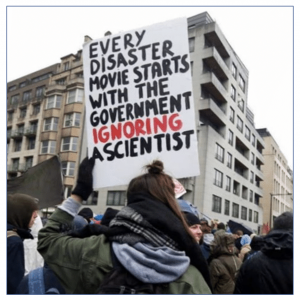COVID-19 Lessons For Climate Change

If there’s any good fallout from the disaster of the Corona virus, it may be the resurrection of sound science. From Washington D.C. to London, political leaders are quickly realizing the limits of spin and hype when disaster strikes. We are now facing the real possibility of millions of deaths with little preparedness for a pandemic. It’s not for lack of warning. From the U.N.’s World Health Organization (WHO) to Dr. Anthony Fauci in the U.S., the warnings have been strong and clear for years. Prepare for pandemics!
Even Microsoft founder, billionaire Bill Gates pointedly told President Trump more than once, and as recently as 2018, that the U.S. government is falling short in preparing the nation and the world for the “significant probability of a large and lethal modern-day pandemic occurring in our lifetimes.” We now know that was about the time the White House was intentionally dismantling the relevant position on the National Security Council. Gates, now a full-time philanthropist leading his own public health nonprofit, has been outspoken about pandemic viruses for years. His TED talk in April 2015, “The Next Outbreak” was prescient. If Gates does not have a big enough microphone and soapbox, no one does.
It’s too early to know how bad the effects of the coronavirus, COVID-19 will be. Unfortunately, It’s too late for the United States to be properly prepared for a pandemic with a functioning public health network, the ability to quickly go into isolation mode, and to administer millions of test kits – the way that South Korea and Singapore demonstrated so capably.
“Every Disaster Movie Starts with the Government Ignoring a Scientist” shown on the above poster was at a climate strike but could apply to the current coronavirus crisis. The scientific community is now unambiguous that we must dramatically reduce greenhouse gas emissions NOW. Each passing year without adequate action brings us ever closer to disaster.
Perhaps it’s a good time to learn some lessons that apply to public health and to climate change:
- Listen to the mainstream scientists (not the few mavericks who revel in being contrarians)
- Plan for disaster while there is time to prepare, not after it happens
- Understand that big problems do not come with precise predictions
The great majority of scientists are giving absolutely clear warnings as to where climate change is headed. The evidence mounts from the extreme melting of the Arctic icecap and the Antarctic glaciers, to the Australian fires, and the record-breaking floods.
Political leaders need to restore science as the underpinning of policy not as something to be subverted, then claiming “who knew this could happen?”
